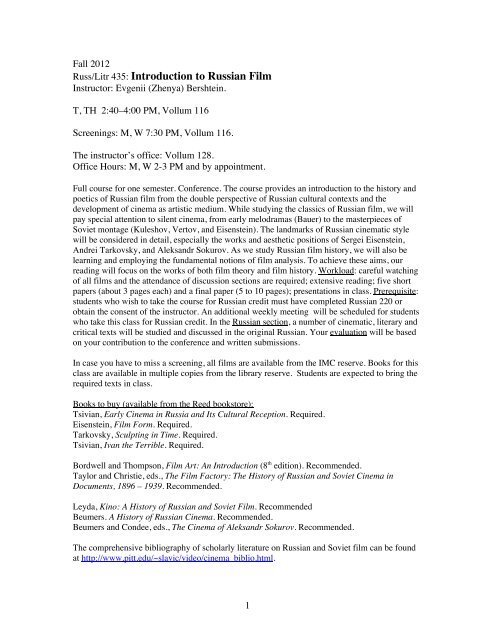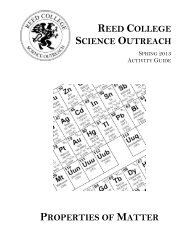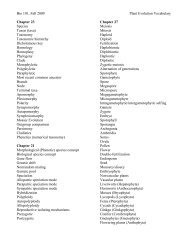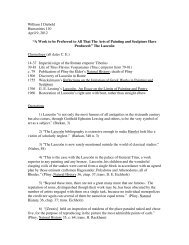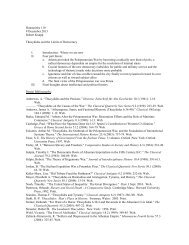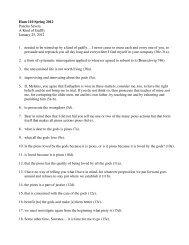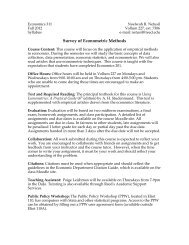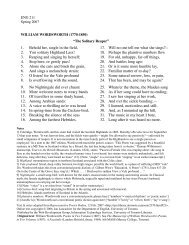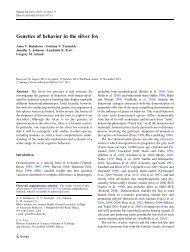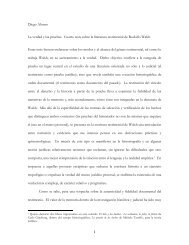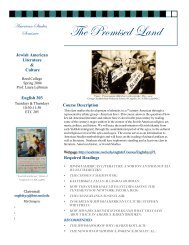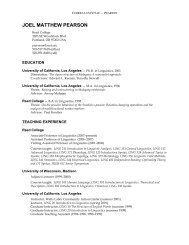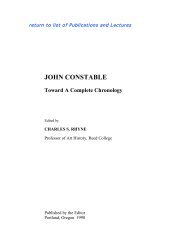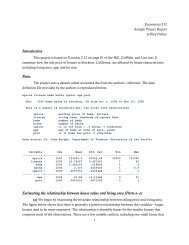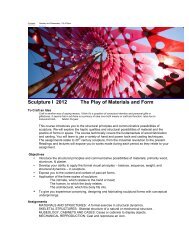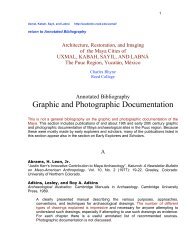Create successful ePaper yourself
Turn your PDF publications into a flip-book with our unique Google optimized e-Paper software.
Fall 2012<br />
Russ/Litr 435: Introduction to Russian Film<br />
Instructor: Evgenii (Zhenya) Bershtein.<br />
T, TH 2:40–4:00 PM, Vollum 116<br />
Screenings: M, W 7:30 PM, Vollum 116.<br />
The instructor’s office: Vollum 128.<br />
Office Hours: M, W 2-3 PM and by appointment.<br />
Full course for one semester. Conference. The course provides an introduction to the history and<br />
poetics of Russian film from the double perspective of Russian cultural contexts and the<br />
development of cinema as artistic medium. While studying the classics of Russian film, we will<br />
pay special attention to silent cinema, from early melodramas (Bauer) to the masterpieces of<br />
Soviet montage (Kuleshov, Vertov, and Eisenstein). The landmarks of Russian cinematic style<br />
will be considered in detail, especially the works and aesthetic positions of Sergei Eisenstein,<br />
Andrei Tarkovsky, and Aleksandr Sokurov. As we study Russian film history, we will also be<br />
learning and employing the fundamental notions of film analysis. To achieve these aims, our<br />
reading will focus on the works of both film theory and film history. Workload: careful watching<br />
of all films and the attendance of discussion sections are required; extensive reading; five short<br />
papers (about 3 pages each) and a final paper (5 to 10 pages); presentations in class. Prerequisite:<br />
students who wish to take the course for Russian credit must have completed Russian 220 or<br />
obtain the consent of the instructor. An additional weekly meeting will be scheduled for students<br />
who take this class for Russian credit. In the Russian section, a number of cinematic, literary and<br />
critical texts will be studied and discussed in the original Russian. Your evaluation will be based<br />
on your contribution to the conference and written submissions.<br />
In case you have to miss a screening, all films are available from the IMC reserve. Books for this<br />
class are available in multiple copies from the library reserve. Students are expected to bring the<br />
required texts in class.<br />
Books to buy (available from the <strong>Reed</strong> bookstore):<br />
Tsivian, Early Cinema in Russia and Its Cultural Reception. Required.<br />
Eisenstein, Film Form. Required.<br />
Tarkovsky, Sculpting in Time. Required.<br />
Tsivian, Ivan the Terrible. Required.<br />
Bordwell and Thompson, Film Art: An Introduction (8 th edition). Recommended.<br />
Taylor and Christie, eds., The Film Factory: The History of Russian and Soviet Cinema in<br />
Documents, 1896 – 1939. Recommended.<br />
Leyda, Kino: A History of Russian and Soviet Film. Recommended<br />
Beumers. A History of Russian Cinema. Recommended.<br />
Beumers and Condee, eds., The Cinema of Aleksandr Sokurov. Recommended.<br />
The comprehensive bibliography of scholarly literature on Russian and Soviet film can be found<br />
at http://www.pitt.edu/~slavic/video/cinema_biblio.html.<br />
1
<strong>Syllabus</strong><br />
Topic One: Early Russian Film (Week 1-2)<br />
T: August 28: Introduction<br />
W, August 29, 7:30 PM. Screening: “Silent Witnesses” (Evgenii Bauer, 1914).<br />
TH, August 30<br />
Reading: Tsivian, Early Cinema in Russia, 1-77;<br />
Film Art, 112-161 (The Shot: Mis-en-Scene)<br />
T, September 4<br />
Reading: Tsivian, Early Cinema in Russia, 78-161;<br />
Film Art, 162–217 (The Shot: Cinematography).<br />
W, September 5: Screening: “The Dying Swan” (Evgenii Bauer, 1917).<br />
TH, September 6.<br />
Reading: Tsivian, Early Cinema in Russia, 162–218.<br />
Writing assignment #1: The Shot in “The Dying Swan” (3 pages).<br />
Topic Two: Film Avant-Garde vs. Tradition in the Soviet 20s (Week 3–5).<br />
M, September 10, 7:30 PM Screening: “Battleship “Potemkin” (Sergei Eisenstein, 1926).<br />
T, September 11.<br />
Reading: Reading: Film Art, 218-263 (Editing), 453-456 (Soviet Montage).<br />
TH, September 13.<br />
Reading: Reading: Film Factory, 87-89, 139–150; Eisenstein’s “Methods of Montage”<br />
in The Film Form, 72-83, “Film Language” in The Film Form, 108-121.<br />
Writing assignment #2: The Effects of Montage in “Battleship “Potemkin”” (3 pages).<br />
Monday, September 17, 7:30. Screening: “Bed and Sofa” (Abram Room, 1927) 9/17<br />
T, September 18<br />
Read: Film Art, 318–337 (Film Genres).<br />
W, September 19, 7:30 PM. Screening: “Man with a Movie Camera” (Dziga Vertov,<br />
1929)<br />
2
TH, September 20<br />
Reading: Film Art, 410–413; Vertov’s essays in The Film Factory, 69-72, 89-94, 112-<br />
114, 129-131, 150-151, 200-203, 299-305, 335-337.<br />
Additional study material: Yuri Tsivian’s commentary on the extra soundtrack on the<br />
DVD of Man with the Movie Camera.<br />
M, September 24, 7:30 PM. Screening: “By the Law” (Lev Kuleshov, 1929)<br />
T, September 25<br />
Reading: Film Art, 74-107 (Narrative).<br />
W, September 26, 7:30 PM. Screening: “Earth” (Aleksandr Dovzhenko, 1930)<br />
TH, September 27.<br />
[Clips from “The Old and the New” [Eisenstein, 1929] to be screened in class].<br />
Reading: Elizabeth Papazian, “Offscreen Dreams and Collective Synthesis in<br />
Dovzhenko's Earth ,”Russian Review 2003: 62 (3), 411–428 (Moodle).<br />
Topic 3: Stalinist Cinema (Week 6-7)<br />
T, October 2 (Screening in Class): “Circus” (Grigorii Aleksandrov, 1936)<br />
Reading: Film Art, 264–303 (Sound in the Cinema); Film Factory, 234-235, 280–282,<br />
305–311, 358–369, 371–377.<br />
TH October 4: discussion of “Circus”<br />
Reading: Film Factory, 358-369, 373-377.<br />
Writing assignment # 3: “A Cinema for the Millions”: What Does This Slogan Mean in<br />
“Circus”? (3 pages).<br />
M, October 1, 7:30 PM: Screening: “Ivan the Terrible. Part 1” (Sergei Eisenstein, 1944)<br />
T, October 9.<br />
Reading: Tsivian, Ivan the Terrible (begin reading).<br />
W, October 11, 7:30 PM. Screening: “Ivan the Terrible. Part 2” (1946)<br />
TH, October 12.<br />
Reading: Tsivian, Ivan the Terrible (finish reading); “Stalin, Molotov and Zhdanov on<br />
Ivan the Terrible, Part Two,” in The Eisenstein Reader, 160-166 (Moodle).<br />
FALL BREAK<br />
3
Topic 4: Cinema of the Thaw (Week 8)<br />
M, October 22, 7:30 PM: “The Cranes Are Flying” (Mikhail Kalatozov,1957)<br />
T, October 23: Guest Instructor Professor Michael Kunichika’99 (NYU).<br />
Reading : TBA<br />
W, October 24, 7:30 “Wings” (Larisa Shepitko, 1966)<br />
TH, October 25<br />
Writing assignment #4: Women in the Cinema of the Thaw (3 pages).<br />
SPECIAL SCREENING: “Faust” (Aleksandr Sokurov, 2012). NWFC, Sunday,<br />
October 28, 4:30 PM, (alternative screening is on Saturday, October 27 at 7 PM)<br />
These screenings are sponsored by <strong>Reed</strong> <strong>College</strong>, and the entry is free for all<br />
members of the <strong>Reed</strong> community.<br />
T, October 30.<br />
Reading: find on the web and summarize three reviews of “Faust”. In class, we will<br />
discuss Sokurov’s “Faust” with the guest instructor, Professor Michael Taylor (German<br />
department).<br />
W, October 31, 7:30PM. Screening: “Ivan Vasilyevich Changes Career” (Leonid<br />
Gaidai, 1973)<br />
TH, November 1<br />
Reading: Aleksandr Prokhorov, “Cinema of Attractions versus Narrative Cinema: Leonid<br />
Gaidai's Comedies and El'dar Riazanov's Satires of the 1960s,” Slavic Review, Vol. 62,<br />
No. 3 (Autumn, 2003), 455-472 (Moodle).<br />
Topic 5: Tarkovsky and Lyrical Cinema (Week 10)<br />
M, November 5, 7:30 PM: “Mirror” (Andrei Tarkovsky, 1974)<br />
T, November 6<br />
Reading: Tarkovsky, Sculpting in Time, 82-163.<br />
TH, November 8<br />
[Clips from “Nostalgia” and “Sacrifice” to be screened in class]<br />
Reading: Tarkovsky, Sculpting in Time, 202–241.<br />
4
Topic 6: Post-Soviet Film: Balabanov and Sokurov (week 11-14).<br />
M, November 12, 7:30 PM. Screening: “”Brother” (Aleksei Balanbanov, 1998)<br />
T, November 13. Discussion of “Brother”<br />
Writing Assignment #5: “What is the Genre of “Brother”, and Is It Important to<br />
Figure It Out?” (3 pages).<br />
TH, November 15<br />
Screening in class: “On Freaks and Men” (Aleksei Balabanov, 1998)<br />
T, November 20. Discussion of “On Freaks and Men.”<br />
TH November 22: THANKGIVING DAY. NO CLASS.<br />
M, November 26, 7:30 PM. Screening: “Russian Ark” (Aleksandr Sokurov, 2002).<br />
T: November 27<br />
Reading: Beumers, “And the Ark Sails On…” in The Cinema of Alexander Sokurov,<br />
176–187.<br />
W, November 29, 7:30 PM. Screening: “Alexandra” (Aleksandr Sokurov, 2008)<br />
TH, November 30<br />
Reading: Nancy Condee, “Endstate and Allegory,” The Cinema of Alexander Sokurov,<br />
188-199.<br />
T, December 4: Summing-Up.<br />
Final papers, containing a comprehensive analysis of a single film, are due in Prof.<br />
Bershtein’s office (Vol 128) by noon on Tuesday, December 11. Electronic submissions<br />
are not accepted.<br />
5


